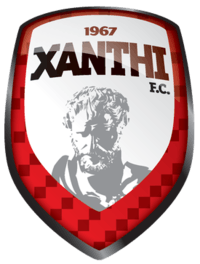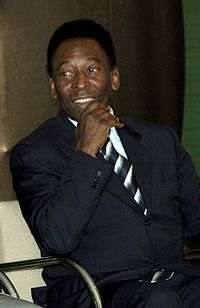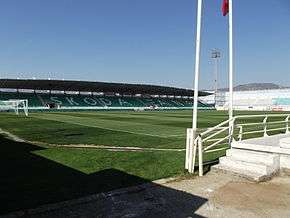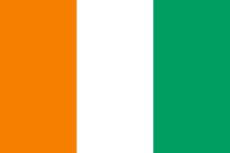Xanthi F.C.
Xanthi Football Club (Greek: Α.Ο. Ξάνθη Π.Α.Ε.) is a Greek professional football club based in Xanthi, Western Thrace. The club competes in the Super League, and plays at Xanthi FC Arena.
 | ||||
| Full name | Α.Ο. Ξάνθη Π.Α.Ε. (AO Xanthi Football Club) | |||
|---|---|---|---|---|
| Nickname(s) | Akrítes (Frontiersmen) | |||
| Short name | AOX | |||
| Founded | 1 January 1967 | |||
| Ground | Xanthi FC Arena | |||
| Capacity | 7,244 | |||
| Owner | InSports PCC (94.38%)[1] | |||
| Chairman | Aristides Pialoglou | |||
| Head coach | Nikos Karageorgiou | |||
| League | Super League Greece | |||
| 2018–19 | Super League Greece, 12th | |||
| Website | Club website | |||
|
| ||||
Founded in 1967, Xanthi is well set up in terms of their financial support and youth setup. Xanthi participated in the UEFA Cup / Europa League in 2001–02, 2005–06, 2006–07 and 2013–14 seasons. In the 2004–05 season, Xanthi finished fourth in the Alpha Ethinki (first division, today Super League), the club's all-time best performance.
Xanthi's first appearance in the first division was in 1989, and the club has been taking part continuously since then.
History
The club was formed in 1967 from the merger of two local clubs: Aspida Xanthi, who was founded in 1922 and was the club of the most popular layers of the region. The "blues" in 1961 had become champions in the Northern League of Beta Ethniki, losing the accession from Panelefsiniakos in the barrage game) and Orfeas Xanthi, who was founded in 1903 and was the bourgeoisie of the city. From 1957 to 1964, Orfeas competed in the Northern Group of the Beta Ethniki (which held in 3 groups).[2] The derby of the two teams was the most characteristic, with the city divided into two in each encounter.
In June 1967, with the Greek military junta in government, the movements in Xanthi were also made to create a team that would unite the dynamics of the two clubs, while the national championships were reorganized. The strengthening of the region in sport at that time had also taken place in other parts of the country and at the same time AO Xanthi (among other clubs) participated directly in the single second national category. Not long ago, from 1967 until 1985, the club remained in the Beta Ethniki, with all the restructuring that had suffered the class and benefited in the early years. The difficulties were great, the revenues were few, but Xanthi's stadium was always filled. The yellow and black beads of Orfeas Xanthi and the shades of Aspida Xanthi, have brought the red of AO Xanthi, which has joined and united the city for many years. Those years were different, difficult, but "sweet". Without the abundance of images, the imagination was rampant, transforming footballers into "holy monsters" of the sport. Something that apply for all teams. 18 years stays Xanthi Football Club on the stadiums of the Beta Ethniki. In this timeframe, the club generally completed the racing season under the 10th place of the scoreboard, while only in 1969–70 they had reached the 7th and the 1974–75 season in the 9th place. When they started to show how they were preparing for the jump in the top division, the 1982–83 season ended 5th, the next 4th and the 1984–85 season which was ambitious for something bigger, they were downgraded.
In 1985–86, with this new administration of Mr. Kokkalas, Xanthi was reformed and returned stronger. First title in the Gamma Ethniki in 1985–86, followed by another three seasons in the Beta Ethniki until the big dream came true. From the 8th and 11th places of '87 and '88 respectively, in the summer of 1989 the city and the club lived unforgettable moments by conquering the title of the Beta Ethniki and at the same time the historic rise in the big lounges. In one year, Xanthi had first goal scorer Achilleas Adamopoulos with 30 goals.
First years in the top division
The first experiences in the Alpha Ethniki were unique, difficult and unforgettable. With enthusiasm, passion and a "hot" atmosphere at the stadium, the basic goal of staying in the early years was achieved with a lot of stress. Mr Kokkala's administration first brought foreign footballers, with the Brazilians Marcelo Veridiano and Sandro making the start and following others. Especially Marcelo, he has a special place in the heart of the fans, as he still continues to be the top scorer of the club. Despite the anxiety and the end result justifying the efforts, Xanthi remained until October 1991 in the Alpha Ethniki and with the same profile.[3]
In the chairmanship of Theodoros Kokkalas, Xanthi had already managed to win two championships in the Gamma and Beta Ethniki, the rise and the renewal of the team stay for two consecutive season in the top division, the Alpha Ethniki. But the top achievement of then Xanthi's administration was to find the ideal choice for the next day of the team, the city and the wider area in the football world. Even randomly, as the original agreement was a sponsorship of Skoda vehicles company in Greece for which the responsible importer in Greece was the company Viamar S.A. by Christos Panopoulos. Everything was done very quickly, but not too quickly, and timing was such a legal one that allowed the clubs to have a "sign" sponsor in their original name. That's how Xanthi was renamed "Skoda Xanthi".[4] The signatures that fell on 10 October 1991 between Kokkalas and Panopoulos at Ledra Marriott hotel in Athens, really took off the shares of the club and kept alive, in time, the names of all those who had been abused for the club.[5]
Panopoulos era

The modern history of Xanthi brings broadly the signature of the great shareholder of the club, Christos Panopoulos,[6] who is already the most long-lasting owner in Greek football, keeping the club to the same high standards that he has set since his first days at the leading peak of Xanthi, as he is called since 2016, when the cooperation with Skoda was ended and the club's name returned to its original.
Also, while several companies perceive marketing as a feature of impressions, Xanthi has been successful since Christos Panopoulos took over this business. In 1991, Xanthi giving its solutions in the economic field and at the same time becoming a rising-initially-and constant force afterwards. They were the first club that established for many years in the 1990s the award of its best Player of the Year, with a donation of a sponsor car. It was the first provincial club that in 1994 had organized an international tournament at the Xanthi Ground with the participation of Coventry City, Portsmouth and AEK Athens. That same year he had brought coach Howard Kendall,[7] who a few months earlier was a coach in Everton. In 2005, the world's top football player, Pelé, launched its sports center and its new stadium Xanthi FC Arena, giving the world glamor to the event.[8] At the same year, on 7 July, Xanthi announced one of the biggest transfers in its history, the Brazilian defensive midfielder Emerson.[9]
On 1 June 2016, Xanthi has changed its name without including "Skoda".
Xanthi has been established in the consciousness of all the fancy public, ending many times higher than all the other provincial clubs. Having reached the final of the Greek Cup in 2015 and in the championship has ended in all the positions except for the relegation. In 2015, Xanthi coached by Răzvan Lucescu lost the trophy from Olympiacos with 3–1.[10]
Crest and colours
Crest
In the early years, the team's emblem consisted exclusively of Democritus. A new emblem with small changes was introduced in 1985. The emblem was retained in this form until 1991 when elements of VIAMAR SA, a new owner of the club, were added. In 1996, Skoda's brand was added. A further change in the emblem took place in 2001, with the addition of the soccer ball, while in 2007 a different version of the particular emblem was presented. In 2012 a new emblem was presented, in which the bust of Democritus was now in the middle.[11][12]
The year 2016 is a new reference point in the history of Xanthi.[13][14] Many and radical changes to issues that were not racing. At the end of the 2015–16 season, and more specifically from 1 June 2016, Skoda Xanthi SA returned to its roots and is now called AO Xanthi Football Club. The cooperation of the "mother" of the football club VIAMAR SA ended with the well-known automotive industry and therefore the association that has linked its name for 25 consecutive years with its sponsor, goes back with its own forces and of course, under the auspices of VIAMAR, the company of the major shareholder Mr. Christos Panopoulos. This has led to many changes. From the name and logo, to the field and the philosophy.[15][16]
Stadium

Xanthi left their old stadium, the Xanthi Ground (capacity 9,500), located near the centre of the city, for the Xanthi FC Arena in 2004.[19] Their new stadium sited 8 km outside the city, near Pigadia village, has a capacity of 7,244, however has only 3 stands. When the final stand is finally built, the new capacity will be around 9,000 seats. The stadium is located in the same place as the sports center of the Thracian Club, a real jewel for Greek football.[20] The sports center includes, among other things, seven stadiums, as well as the hotel "Le Chalet". The construction of the stadium itself, costing €6,500,000.
The first game at the Xanthi FC Arena took place on 18 September 2004, with the team of Xanthi being imposed 3–1 on Aris for the 1st match of Alpha Ethniki Championship for the 2004–05 season.[21]
The stadium was officially inaugurated by the Brazilian legend Pelé on 12 May 2005.[22][23]
On 16 January 2005, and before the game with Ionian a fan of Xanthi, Stamatis Georgoudakis lost his life.[24] Since then the Gate B-C has been named after the stadium. The ticket record was played with Panathinaikos on 20 January 2007 with 6,642 spectators. In the summer of 2016, the stadium was renamed "Xanthi FC Arena".[25]
Facilities
Right next to Xanthi FC Arena, there is the club's athletic center, which, in addition to the two courts, has all the necessary spaces for coaches, players and staff to work on their field.[26][27] In a huge area almost adjacent to the stadium, it is located in the sports center of Xanthi, with the "despotic" presence of the hotel Le Chalet.[28] A hotel that after its complete destruction on 7 March 2003 by fire,[29] was not the few who supported, that Christos Panopoulos would leave everything and would be away from the team and generally from football. This has not been done, and to this day, Le Chalet overlooking the 7 football fields, the pool, the pool bar, the basketball court, the tennis court and the changing rooms, has all the specifications for an excellent sporting preparation. For the team of Xanthi and all the departments of its Academy and many other clubs that have preferred the athletic center of Xanthi to preparation before the start of the season. In 2017, it was also characteristic that the coach of Greece, Michael Skibbe, in one of his first statements as a federal coach, referring to the sports center of Xanthi with the best words.
Honours
Domestic
League history
|
Seasons in the 21st century
| Season | Category | Position | Cup |
|---|---|---|---|
| 2000–01 | Alpha Ethniki | 8th | QF |
| 2001–02 | Alpha Ethniki | 5th | SF |
| 2002–03 | Alpha Ethniki | 9th | 2R |
| 2003–04 | Alpha Ethniki | 10th | R16 |
| 2004–05 | Alpha Ethniki | 4th | SF |
| 2005–06 | Alpha Ethniki | 5th | QF |
| 2006–07 | Super League | 11th | SF |
| 2007–08 | Super League | 8th | QF |
| 2008–09 | Super League | 7th | QF |
| 2009–10 | Super League | 13th | QF |
| 2010–11 | Super League | 9th | 4R |
| 2011–12 | Super League | 11th | 5R |
| 2012–13 | Super League | 7th | 4R |
| 2013–14 | Super League | 16th | 2R |
| 2014–15 | Super League | 8th | RU |
| 2015–16 | Super League | 13th | GS |
| 2016–17 | Super League | 6th | QF |
| 2017–18 | Super League | 6th | R16 |
| 2018–19 | Super League | 12th | R16 |
Best position in bold.
Key: 2R = Second Round, 3R = Third Round, 4R = Fourth Round, 5R = Fifth Round, GS = Group Stage, R16 = Round of 16, QF = Quarter-finals, SF = Semi-finals.
European matches
| Season | Competition | Round | Opponent | Home | Away | Aggregate |
|---|---|---|---|---|---|---|
| 2002–03 | UEFA Cup | First round | 0–0 | 0–4 | 0–4 | |
| 2005–06 | UEFA Cup | First round | 0–0 | 0–2 | 0–2 | |
| 2006–07 | UEFA Cup | First round | 3–4 | 1–4 | 4–8 | |
| 2013–14 | UEFA Europa League | Second qualifying round | 0–1 | 2–1 (aet) | 2–2 (a) | |
| Third qualifying round | 1–2 | 1–2 | 2–4 | |||
Players
Current squad
- As of 4 January 2020[32]
Note: Flags indicate national team as defined under FIFA eligibility rules. Players may hold more than one non-FIFA nationality.
|
|
Out on loan
Note: Flags indicate national team as defined under FIFA eligibility rules. Players may hold more than one non-FIFA nationality.
|
Retired numbers
- 13

- 56

Notable former players
Personnel
| Executive | |
|---|---|
| Owner | |
| Chairman | |
| Vice-Chairman | |
| Chief executive officer | |
| Board Member | |
| Board Member | |
| First team staff | |
| Sport director | |
| Head coach | |
| Assistant coach | |
| Goalkeeper coach | |
| Sports science & medicine manager | |
| Strength & conditioning coach | |
| Physiotherapist | |
| Caretaker | |
| Under-20s & academy coaching staff | |
| Academy manager | |
| Academy goalkeeping coach | |
| Under 20s lead coach | |
| Under 17s lead coach | |
| Under 15s lead coach | Vacant |
Former personnel
Co-trainer


Director of Sport

Current sponsorships
- Great Shirt Sponsor: thefoodballer
- Official Sport Clothing Manufacturer: Joma
- Golden Sponsor: Goldair tourism
Managerial history
|
|
References
- http://www.gazzetta.gr/football/superleague/article/1332336/i-epitropi-epaggelmatikoy-athlitismoy-edose-xana-anavoli-gia-tin-xanthi
- "Xanthi's history". xanthifc.gr.
- "Six Brazilians of Xanthi that make history". menshouse.gr.
- "When Xanthi became "Skoda Xanthi"". onsports.gr.
- "Football clubs with a sponsor in their names" (in Greek). sport24.gr.
- "Who is Christos Panopoulos" (in Greek). xanthifc.gr.
- "Howard Kendall" (in Greek). blessedfootball.blogspot.com.
- "Grand opening of the new stadium from a football legend" (in Greek). ant1news.gr. Retrieved 12 May 2005.
- "Xanthi signed Emerson" (in Greek). sport-fm.gr. Retrieved 7 July 2005.
- "Greek Cup Final of 2015". sport24.gr. Retrieved 23 May 2015.
- "With a new crest Skoda Xanthi" (in Greek). sport24.gr. Retrieved 26 May 2012.
- "Democritus in the crest's middle" (in Greek). empros.gr. Retrieved 30 May 2012.
- "New era in Xanthi - Changed club's crest" (in Greek). sport-fm.gr. Retrieved 7 June 2016.
- "Why did "Skoda Xanthi" become... plain "Xanthi"?" (in Greek). newsauto.gr. Retrieved 7 June 2016.
- "Xanthi changed its crest and name!". sport24.gr. Retrieved 7 June 2006.
- "History of Xanthi's crest" (in Greek). thrakisports.gr. Retrieved 26 August 2017.
- "Orfeas Xanthi crest and colours". google.gr.
- "Aspida Xanthi crest and colours". google.gr.
- "Xanthi's home ground" (in Greek). xanthifc.gr.
- "Xanthi FC Arena's location" (in Greek). sportslocations.blogspot.com.
- "First game in Xanthi FC Arena". whoscored.com. Retrieved 18 September 2004.
- "Pelé: "The most modern sports center"". sport-fm.gr. Retrieved 13 May 2005.
- "Pelé: "Well done in Xanthi!"". tanea.gr. Retrieved 13 May 2005.
- "Black day in Xanthi". xanthipress.gr.
- "Xanthi's home ground renamed" (in Greek). thrakisports.gr.
- "Athletic center". xanthifc.gr.
- "View of Xanthi's training facilities". xanthifc.gr.
- "Le Chalet, training center" (in Greek). lechalet.gr.
- "The fire of the Le Chalet". sport24.gr.
- Abbink, Dinant & Mastrogiannopoulos, Alexander (7 August 2003). "Greece – Final Tables 1959–1999". RSSSF.
- Abbink, Dinant & Mastrogiannopoulos, Alexander (18 May 2005). "Greece – List of Second Level Final Tables". RSSSF.
- "Skoda Xanthi squad" (in Greek). Superleague Greece. Retrieved 23 March 2012.
External links
| Wikimedia Commons has media related to Xanthi FC. |
- Official websites
- Official website (in Greek)
- Xanthi at Super League (in English and Greek)
- Xanthi at UEFA (in English)
- News sites
- Xanthi on xanthi-sport.gr (in Greek)
- Xanthi news from Nova Sports
- Other